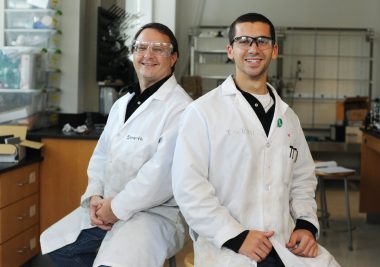Elon University senior Anthony Rizzuto has been named the recipient of a 2010 Eastern Analytical Symposium Student Research Award, a highly competitive national prize in the chemistry field given each year to six undergraduate researchers.

Selections are made based on letters of support by mentors, and the selection committee looks for indications the student will be successful after graduation and while exhibiting potential for careers that will contribute to the profession.
Rizzuto, an Elon College Fellow and Lumen Scholar chemistry major, is the second Elon student to receive the award since 2003. His research focuses on the study of compounds that might facilitate the conversion of carbon dioxide into more useful materials.
“I was very excited to receive the award,” Rizzuto said. “It’s an honor for me to be recognized for all of the time and effort I’ve put into this research.”
Carbon dioxide can be converted into substances such as carbon monoxide or methane, both of which can be used as fuels, but normally that conversion takes an enormous amount of energy. Rizzuto directs his efforts to studying chemicals that can significantly reduce the amount of energy required for such reactions.
As part of the award, Rizzuto receives free registration for the Eastern Analytical Symposium conference in November, and the EAS will cover his travel and housing expenses related to the conference.
Before Rizzuto began his research, he studied various physical and chemical properties of the unique solvent that would be used, which is a binary mixture of acetonitrile and butyl-3-methylimidazolium hexafluorophosphate. He and his research mentor, professor Karl Sienerth, along with UNC Chapel Hill student Rachel Pennington, submitted a paper describing the results of that study to The Journal of Electroanalytical Chemistry.
Rizzuto and Sienerth are authoring a second paper describing the discovery of a new carbon dioxide reduction catalyst. Rizzuto’s current research, supported by the Lumen Scholar program, is a comparison of different methods of deploying the newly identified catalyst.
As his mentor, Sienerth will also receive free registration for the EAS conference, where Rizzuto will participate in a special poster session for the six recipients and be honored at the Student Award Luncheon and the President’s Reception.
A native of Wilmington, N.C., Rizzuto plans to attend graduate school and eventually seek a Ph.D. in analytical or physical chemistry. He said he hopes his formal education will be followed by a career in academic teaching, mentoring and scholarship.


